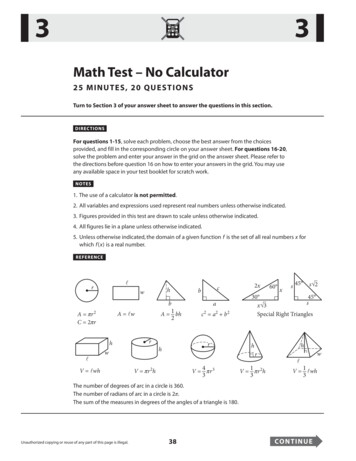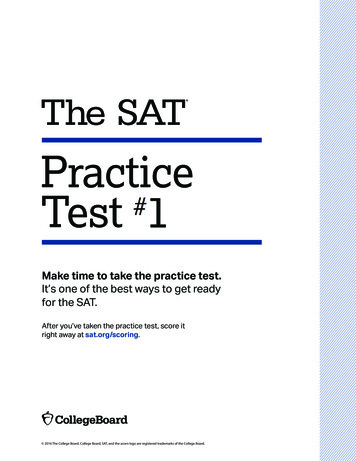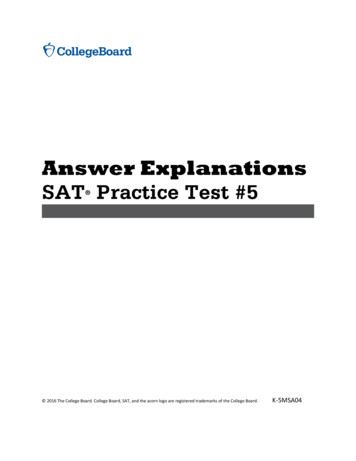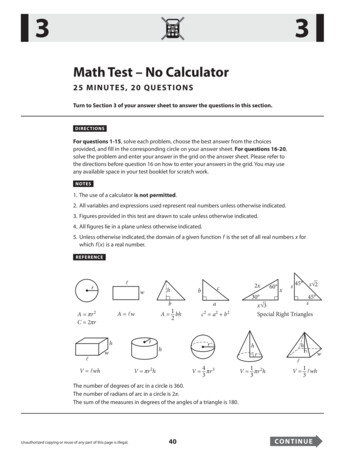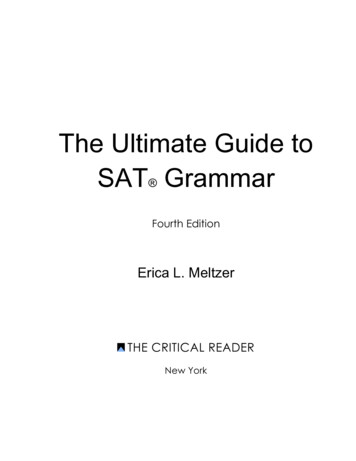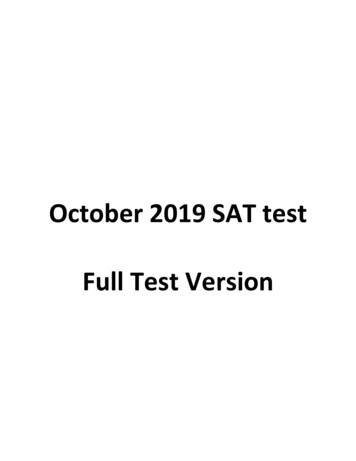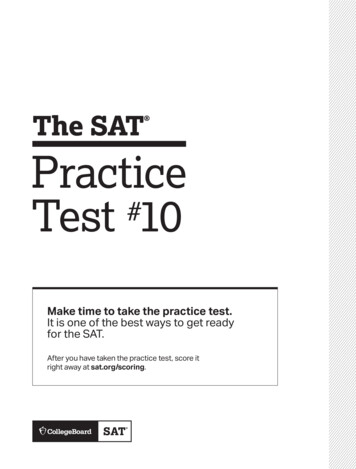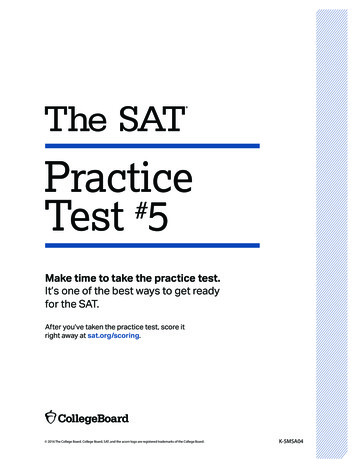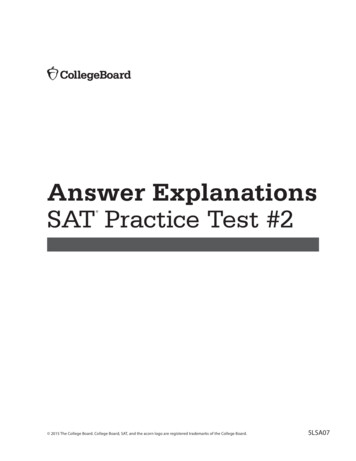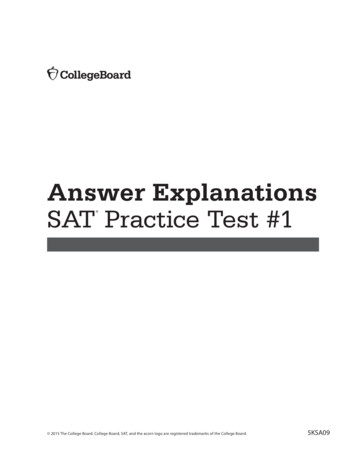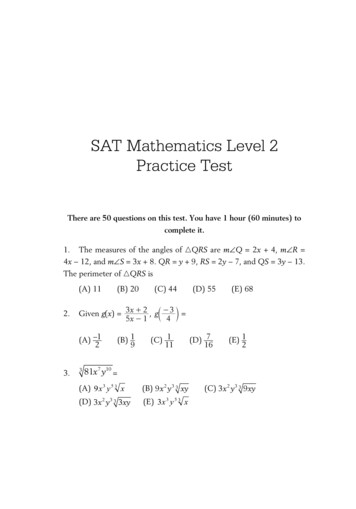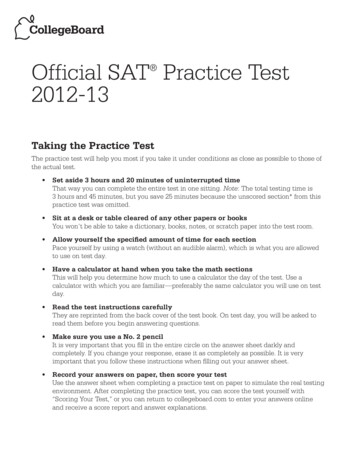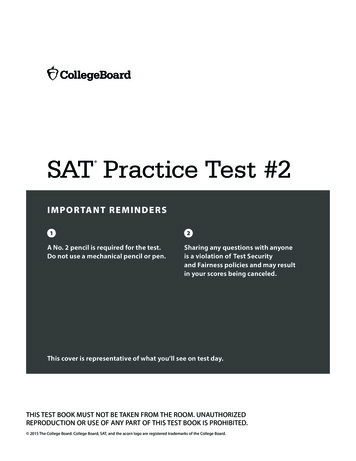
Transcription
SAT Practice Test #2 IMPORTANT REMINDERSA No. 2 pencil is required for the test.Do not use a mechanical pencil or pen.Sharing any questions with anyoneis a violation of Test Securityand Fairness policies and may resultin your scores being canceled.This cover is representative of what you’ll see on test day.THIS TEST BOOK MUST NOT BE TAKEN FROM THE ROOM. UNAUTHORIZEDREPRODUCTION OR USE OF ANY PART OF THIS TEST BOOK IS PROHIBITED. 2015 The College Board. College Board, SAT, and the acorn logo are registered trademarks of the College Board.
Test begins on the next page.
11Reading Test65 M I NU TES, 5 2 QUESTIONSTurn to Section 1 of your answer sheet to answer the questions in this section.DIRECTIONSEach passage or pair of passages below is followed by a number of questions. After readingeach passage or pair, choose the best answer to each question based on what is stated orimplied in the passage or passages and in any accompanying graphics (such as a table orgraph).This passage is from Charlotte Brontë, The Professor,originally published in 1857.Line5101520No man likes to acknowledge that he has made amistake in the choice of his profession, and everyman, worthy of the name, will row long against windand tide before he allows himself to cry out, “I ambaffled!” and submits to be floated passively back toland. From the first week of my residence in X—— Ifelt my occupation irksome. The thing itself—thework of copying and translating business-letters—was a dry and tedious task enough, but had that beenall, I should long have borne with the nuisance; I amnot of an impatient nature, and influenced by thedouble desire of getting my living and justifying tomyself and others the resolution I had taken tobecome a tradesman, I should have endured insilence the rust and cramp of my best faculties; Ishould not have whispered, even inwardly, that Ilonged for liberty; I should have pent in every sigh bywhich my heart might have ventured to intimate itsdistress under the closeness, smoke, monotony, andjoyless tumult of Bigben Close, and its panting desirefor freer and fresher scenes; I should have set up theimage of Duty, the fetish of Perseverance, in mysmall bedroom at Mrs. King’s lodgings, and they twoshould have been my household gods, from whichUnauthorized copying or reuse of any part of this page is illegal.Questions 1-10 are based on the followingpassage.253035404550552my darling, my cherished-in-secret, Imagination, thetender and the mighty, should never, either bysoftness or strength, have severed me. But this wasnot all; the antipathy which had sprung up betweenmyself and my employer striking deeper root andspreading denser shade daily, excluded me fromevery glimpse of the sunshine of life; and I began tofeel like a plant growing in humid darkness out of theslimy walls of a well.Antipathy is the only word which can express thefeeling Edward Crimsworth had for me—a feeling, ina great measure, involuntary, and which was liable tobe excited by every, the most trifling movement,look, or word of mine. My southern accent annoyedhim; the degree of education evinced in my languageirritated him; my punctuality, industry, andaccuracy, fixed his dislike, and gave it the highflavour and poignant relish of envy; he feared that Itoo should one day make a successful tradesman.Had I been in anything inferior to him, he would nothave hated me so thoroughly, but I knew all that heknew, and, what was worse, he suspected that I keptthe padlock of silence on mental wealth in which hewas no sharer. If he could have once placed me in aridiculous or mortifying position, he would haveforgiven me much, but I was guarded by threefaculties—Caution, Tact, Observation; and prowlingand prying as was Edward’s malignity, it could neverbaffle the lynx-eyes of these, my natural sentinels.Day by day did his malice watch my tact, hoping itwould sleep, and prepared to steal snake-like on itsslumber; but tact, if it be genuine, never sleeps.CO NTI N U E
16570I had received my first quarter’s wages, and wasreturning to my lodgings, possessed heart and soulwith the pleasant feeling that the master who hadpaid me grudged every penny of that hard‑earnedpittance—(I had long ceased to regardMr. Crimsworth as my brother—he was a hard,grinding master; he wished to be an inexorabletyrant: that was all). Thoughts, not varied but strong,occupied my mind; two voices spoke within me;again and again they uttered the same monotonousphrases. One said: “William, your life is intolerable.”The other: “What can you do to alter it?” I walkedfast, for it was a cold, frosty night in January; as Iapproached my lodgings, I turned from a generalview of my affairs to the particular speculation as towhether my fire would be out; looking towards thewindow of my sitting-room, I saw no cheering redgleam.6011Which choice best summarizes the passage?A) A character describes his dislike for his new joband considers the reasons why.B) Two characters employed in the same officebecome increasingly competitive.C) A young man regrets privately a choice that hedefends publicly.D) A new employee experiences optimism, thenfrustration, and finally despair.2The main purpose of the opening sentence of thepassage is toA) establish the narrator’s perspective on acontroversy.B) provide context useful in understanding thenarrator’s emotional state.C) offer a symbolic representation ofEdward Crimsworth’s plight.D) contrast the narrator’s good intentions with hismalicious conduct.Unauthorized copying or reuse of any part of this page is illegal.33During the course of the first paragraph, thenarrator’s focus shifts fromA) recollection of past confidence toacknowledgment of present self-doubt.B) reflection on his expectations of life as atradesman to his desire for another job.C) generalization about job dissatisfaction to thespecifics of his own situation.D) evaluation of factors making him unhappy toidentification of alternatives.4The references to “shade” and “darkness” at the endof the first paragraph mainly have which effect?A) They evoke the narrator’s sense of dismay.B) They reflect the narrator’s sinister thoughts.C) They capture the narrator’s fear of confinement.D) They reveal the narrator’s longing for rest.5The passage indicates that Edward Crimsworth’sbehavior was mainly caused by hisA) impatience with the narrator’s high spirits.B) scorn of the narrator’s humble background.C) indignation at the narrator’s rash actions.D) jealousy of the narrator’s apparent superiority.6The passage indicates that when the narrator beganworking for Edward Crimsworth, he viewedCrimsworth as aA) harmless rival.B) sympathetic ally.C) perceptive judge.D) demanding mentor.CO NTI N U E
1Which choice provides the best evidence for theanswer to the previous question?A) Lines 28-31 (“the antipathy . . . life”)B) Lines 38-40 (“My southern . . . irritated him”)C) Lines 54-56 (“Day . . . slumber”)D) Lines 61-62 (“I had . . . brother”)8At the end of the second paragraph, the comparisonsof abstract qualities to a lynx and a snake mainlyhave the effect ofA) contrasting two hypothetical courses of action.B) conveying the ferocity of a resolution.C) suggesting the likelihood of an altercation.D) illustrating the nature of an adversarialrelationship.Unauthorized copying or reuse of any part of this page is illegal.719The passage indicates that, after a long day ofwork, the narrator sometimes found his livingquarters to beA) treacherous.B) dreary.C) predictable.D) intolerable.10Which choice provides the best evidence for theanswer to the previous question?A) Lines 17-21 (“I should . . . scenes”)B) Lines 21-23 (“I should . . . lodgings”)C) Lines 64-67 (“Thoughts . . . phrases”)D) Lines 68-74 (“I walked . . . gleam”)4CO NTI N U E
11.Questions 11-21 are based on the followingpassage and supplementary material.This passage is adapted from Iain King, “Can Economics BeEthical?” 2013 by Prospect Publishing.Line510152025303540Recent debates about the economy haverediscovered the question, “is that right?”, where“right” means more than just profits or efficiency.Some argue that because the free markets allowfor personal choice, they are already ethical. Othershave accepted the ethical critique and embracedcorporate social responsibility. But before we canlabel any market outcome as “immoral,” or sneer ateconomists who try to put a price on being ethical,we need to be clear on what we are talking about.There are different views on where ethics shouldapply when someone makes an economic decision.Consider Adam Smith, widely regarded as thefounder of modern economics. He was a moralphilosopher who believed sympathy for others wasthe basis for ethics (we would call it empathynowadays). But one of his key insights in The Wealthof Nations was that acting on this empathy could becounter-productive—he observed people becomingbetter off when they put their own empathy aside,and interacted in a self-interested way. Smith justifiesselfish behavior by the outcome. Whenever plannersuse cost-benefit analysis to justify a new railway line,or someone retrains to boost his or her earningpower, or a shopper buys one to get one free, they areusing the same approach: empathizing withsomeone, and seeking an outcome that makes thatperson as well off as possible—although the personthey are empathizing with may be themselves in thefuture.Instead of judging consequences, Aristotlesaid ethics was about having the rightcharacter—displaying virtues like courage andhonesty. It is a view put into practice wheneverbusiness leaders are chosen for their good character.But it is a hard philosophy to teach—just how muchloyalty should you show to a manufacturer that keepslosing money? Show too little and you’re a “greed isgood” corporate raider; too much and you’re wastingmoney on unproductive capital. Aristotle thoughtthere was a golden mean between the two extremes,and finding it was a matter of fine judgment. But ifethics is about character, it’s not clear what thosecharacteristics should be.Unauthorized copying or reuse of any part of this page is illegal.5455055606570758085There is yet another approach: instead of rootingethics in character or the consequences of actions, wecan focus on our actions themselves. From thisperspective some things are right, some wrong—weshould buy fair trade goods, we shouldn’t tell lies inadvertisements. Ethics becomes a list ofcommandments, a catalog of “dos” and “don’ts.”When a finance official refuses to devalue a currencybecause they have promised not to, they are definingethics this way. According to this approachdevaluation can still be bad, even if it would makeeverybody better off.Many moral dilemmas arise when these threeversions pull in different directions but clashes arenot inevitable. Take fair trade coffee (coffee that issold with a certification that indicates the farmersand workers who produced it were paid a fair wage),for example: buying it might have goodconsequences, be virtuous, and also be the right wayto act in a flawed market. Common ground like thissuggests that, even without agreement on whereethics applies, ethical economics is still possible.Whenever we feel queasy about “perfect”competitive markets, the problem is often rooted in aphony conception of people. The model of man onwhich classical economics is based—an entirelyrational and selfish being—is a parody, asJohn Stuart Mill, the philosopher who pioneered themodel, accepted. Most people—even economists—now accept that this “economic man” is a fiction.We behave like a herd; we fear losses more than wehope for gains; rarely can our brains process all therelevant facts.These human quirks mean we can never makepurely “rational” decisions. A new wave of behavioraleconomists, aided by neuroscientists, is trying tounderstand our psychology, both alone and ingroups, so they can anticipate our decisions in themarketplace more accurately. But psychology canalso help us understand why we react in disgust ateconomic injustice, or accept a moral law asuniversal. Which means that the relatively newscience of human behavior might also define ethicsfor us. Ethical economics would then emerge fromone of the least likely places: economists themselves.CO NTI N U E
11Amount (US cents per lb)Regular Coffee ProfitsCompared to Fair Trade CoffeeProfits in 008fair trade coffeeregular coffeeAdapted from the Fair Trade Vancouver website.The main purpose of the passage is toA) consider an ethical dilemma posed bycost-benefit analysis.B) describe a psychology study of ethical economicbehavior.C) argue that the free market prohibits ethicaleconomics.D) examine ways of evaluating the ethics ofeconomics.Unauthorized copying or reuse of any part of this page is illegal.
SAT Practice Test #2 a no. 2 pencil is required for the test. do not use a mechanical pencil or pen. sharing any questions with anyone is a violation of test security and Fairness policies and may result in your scores being canceled. THIS TEST BOOK MUST NOT BE TAKEN FROM THE ROOM. UNAUTHORIZED
